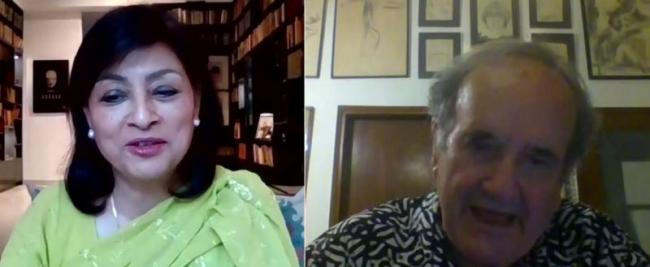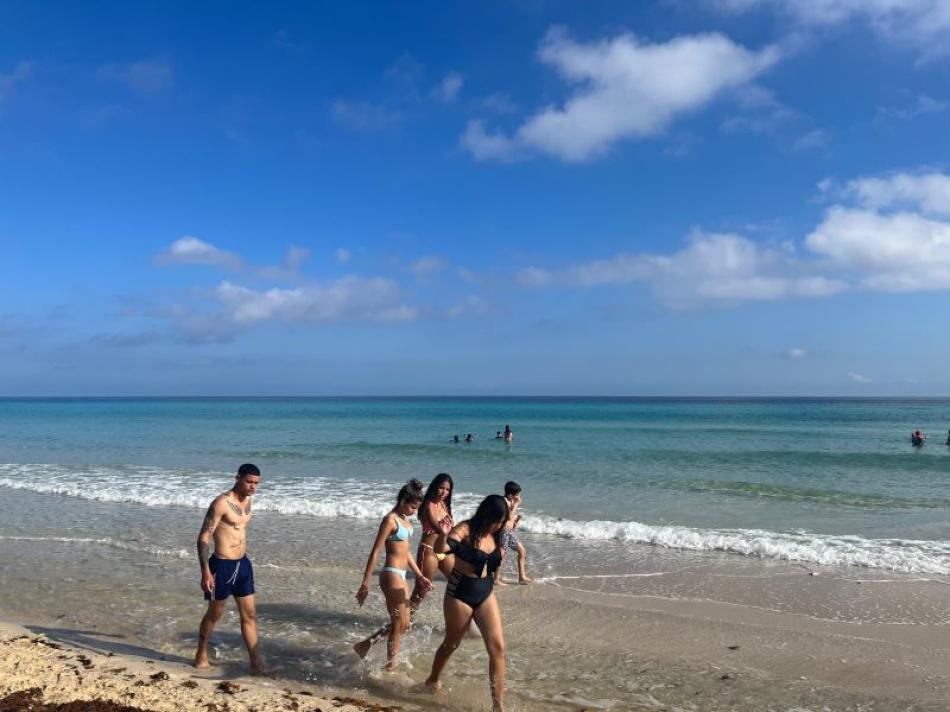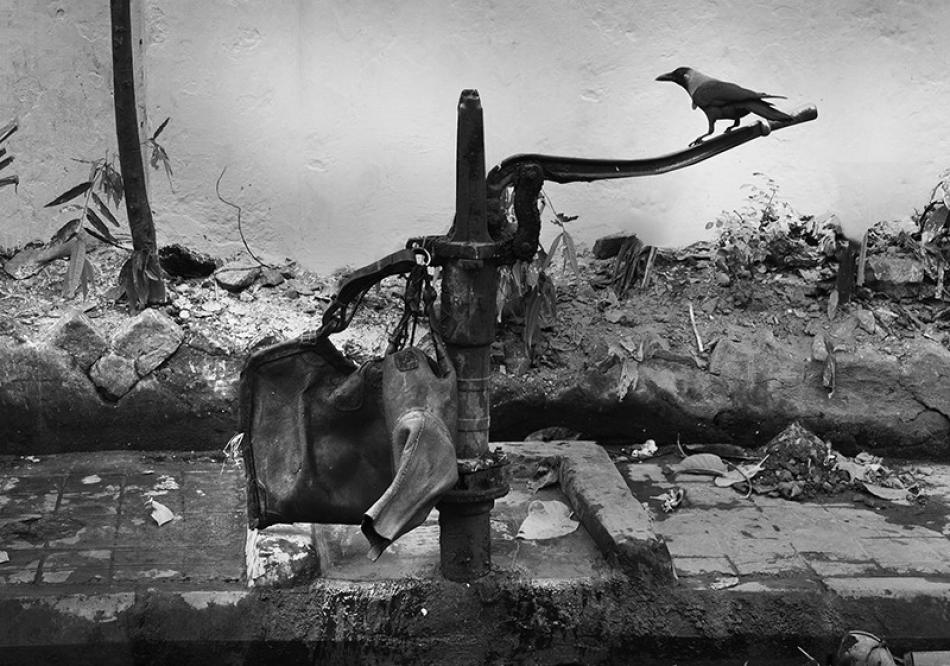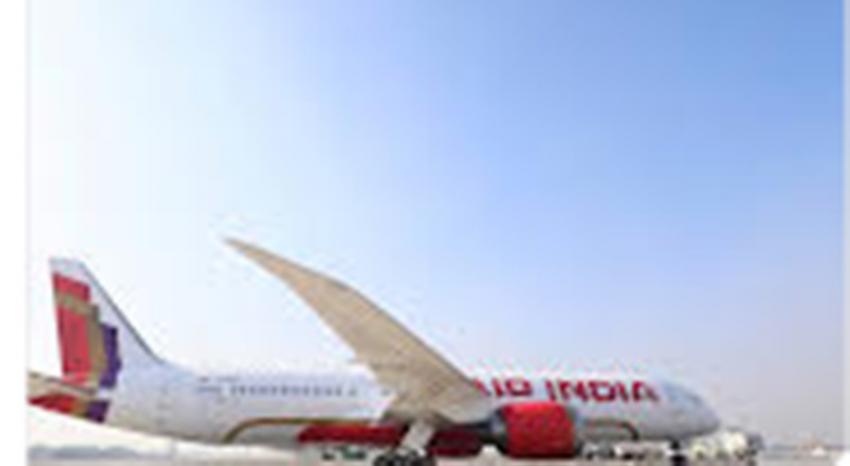NITN | @notintownlive | 17 Oct 2020, 10:02 pm

Kolkata: Octogenarian journalist Mark Tully has recently lamented the present day's sensational journalism and falling standards of television news, expressing his eagerness to turn on to radio again.
"India has a terrible history of going through traumas and then everything goes on as if nothing happened. I think it is so unfair that you have media trials and very often the person is found not guilty, but we never hear about that at all.
"I often move away from the news bulletins as you see the same sort of standard coverage presented as tonight’s `big story’ with no background, nothing about why it is happening."
Tully also said that it is appalling and sad that the colonial legacy of a “governing police force” rather than a “serving police force” is still operational in India.
In an hourlong Tete-a-Tea session organized by Prabha Khaitan Foundation of Kolkata, Tully - the voice and face of BBC in South Asia for three decades – reminisced about his childhood in Calcutta where he was born.
He shared his views on making curries, his love for the radio and the railways.
Tully also touched upon a range of topics germane to the current state of affairs in India.
Mark Tully explained, "The problem is basically that the owners and proprietors of television channels think what people want to see is breaking news, and to some extent they are right. But they are obsessed with getting the maximum viewers and so they stick by the rule – news is the views of the day."
"I believe very strongly in radio as a medium. Even now, I often turn to radio rather than television if I want to be entertained. I love listening to radio drama. One of the reasons is that your imagination is at work and you are free to imagine for yourself - What it was all about! What the picture was like! We the radio people would say, the picture is always better because it’s your own picture," he said.
Commenting on existing colonial legacies in India, Mark Tully said, “I think there are still a lot of colonial legacies in Indian life, particularly in administration and governance. It is most striking in the police which is appalling. A senior police friend used to say there are two types of police force – the governing and the serving.
"The governing police force’s top priority is to maintain law and order and the serving police force’s job is to serve the public. India under colonial rule had a governing police force which supported the government whether it was right or wrong, legal or illegal. What India needs is a serving police force.”
He further said, "Only recently there was a terrible picture of a police refusing to allow the family of a girl, who had been brutally raped to die, to cremate her in day time. The police even stopped the family from attending the cremation fearing there would be some riots or problems if they allowed the family to cremate the girl when they wanted to so. We saw the way the police were talking to the family and it was a terrible sight, and it was just absolute governing police force, rather than the serving police force. Well everyone is afraid of the police in India, no one wants to call the police to help them, which is evident."
Mark Tully, who was sent to a British boarding school in Darjeeling, said, "I wasn’t born a white in a sea of brown. I was actually born in a little pond of white because our whole life was white. We had no Indian friends. We didn’t play with Indian children at all. We had a European British nanny whose job was to supervise us all day, make sure who we played with and make sure we did not get close to the sun. I did not have the privilege of learning Hindi as a child. We lived an entirely white and English life."
"I went to school in Darjeeling because it was a school especially for English children. We had a wonderful headmaster who was a Quaker, a liberal who allowed us to go all over the place and I had much more contact with the outside world,” Tully said.
Reiterating his love for the railways and steam engines, Tully said, "As for my love for railways, a part of it goes back to my childhood days. We used to go from the magnificent Howrah station to Puri, Siliguri, Hazaribagh and other places. So, I did a lot of railway travelling and I loved it. I was always fascinated by the concept of this enormous amount of steel, a huge thing and the huge distances that it was going to cover.
"I loved the steam engines in particular. And I can boast a little by saying that I am the Vice-President of Indian Steam Railways Society, which is a great honour. I have also travelled in a saloon from Karachi to Quetta and on many such journeys.”
"The steam engines are the nearest things to a human being in machines. I think they are like a human, very temperamental, they are very difficult to drive well, you have to worry about so many different things in them. But, a steam engine in full speed is a magnificent sight - you see the smoke coming out and puffing its way. In England now, steam railways are a huge big business.
"In India we run steam engines occasionally on the mainland but we don’t have special rails to run them on and we don’t have railways run by volunteers like we have in England. I wish we did have that in India," Tully said.
"I have an absolute horror for aeroplanes. I think that it is the most boring, dull, drab method of travel anyone has ever invented. I love travelling by ships as well," he said.
On improvement of women's substantiality in India, he said, "Yes. Definitely. I also think that they are much more prepared to fight for their rights. I think lots of women would say there is still a long way to go, but I think the situation has improved. I think that it would be a very good thing to fix a minimum number of women members at the Parliament and of all other assemblies,” he said.
On being asked what he still wants to achieve in his illustrious life, Mark Tully, the author of nine books, said, “I would like to write a book and improve my Hindi.”
- ‘This Union budget is about building capacity, not chasing short-term consumption’
- AI will replace surgeons, coders — and billions of jobs, warns Sraddhalu Ranade at MCHD-SKC Memorial Lecture
- Religion without servility: Journalist Anshul Chaturvedi on why Vivekananda speaks to believers and atheists alike
- Culturist Sundeep Bhutoria unveils anthology When Gods Don't Matter at Jaipur LitFest 2026
- Kolkata CP urges elderly to stay alert against digital scams at ‘Pronam’ interaction
- Sona Incubations, Salem picks 17 startups for Rs 11 Mn DST investment, grant
- Visva-Bharati University unveils a transformational roadmap under Vice-Chancellor Dr. Probir Kumar Ghosh
- Sona College of Technology hosts Think Salem 2025: To spur startup opportunity from Tier-2 Cities
- ACM India unveils National AI Olympiad 2026 to spot school talent for global AI stage
- Reject Macaulayan education, reclaim Indian values: H M Bangur’s big World Hindu Economic Forum pitch
Gurgaon : Air India, India’s leading global airline, has unveiled a completely refreshed beverage collection, one that brings together some of the world’s most celebrated wines and spirits at 35,000 feet on international routes.
Indian airline major Air India today announced a significant enhancement to its popular Mumbai-Frankfurt route, with the deployment of its newly delivered, first line-fit (or made-for-Air India)
Saudia, the national flag carrier of Saudi Arabia, and Air India, India’s leading global airline, have signed a codeshare agreement that will take effect in February.





